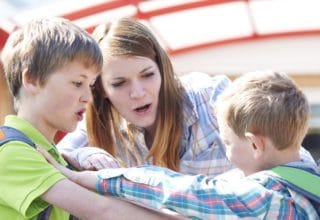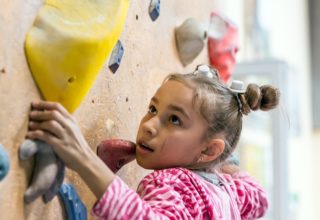Learn how to respond to your child’s challenging behavior or big emotions with empathy. Use our go-to parenting scripts for 15 common scenarios among young children.
Do
When your child is going through challenging behavior or big emotions (overwhelmed, stressed, tired, frustrated, worried, etc.), it can be hard to know how to respond in the heat of the moment. Responding (not reacting) shows empathy. It says to a child, “I can help you process your big emotions. We can solve this problem together and we don’t need to solve it right now. You can trust me. It’s going to be OK.”
By responding, we validate a child’s feelings and give them the space and permission to express their ideas and emotions. By responding, we avoid confronting a child’s overcharged emotions with our potentially even bigger, overcharged emotions that may try to ‘fix a problem’ or to ‘get over it.’
Responding (not reacting) takes practice, patience and may not come naturally. It’s easy for voices to escalate, words to cascade and irrational behavior to take hold. In the classroom, we (teachers) only have seconds to respond; we have to think on our feet and often in front of other children and grown-ups as an example. So, here’s how we do it. This is a go-to script for 15 common scenarios.
How to Respond to Your Child When…
| When Your Child… | What You Could Say… |
| Is upset or crying |
|
| Is whining |
|
| Says, “It’s not fair!” |
|
| Is being uncooperative | (Grown-up is feeling overwhelmed, irritated, annoyed)
(Child is not doing something. Game-ify it)
|
| Says something hurtful |
|
| Is fighting with a sibling |
|
| Hits, kicks, bites |
|
| Talks back |
|
| Says, “I can’t do it!” |
|
| Makes a mistake |
|
| Makes a poor choice | (With humor)
|
| Breaks a rule, a family agreement | (Calmly state the rule.)
|
| Spills / makes a mess | (Pause. Deep breath.)
|
| Has a lot of energy |
|
| Doesn’t want to pause from their activity to eat / snack |
|
*Note: These simple phrases will not solve behavioral challenges. There are no quick fixes. But, these phrases can help kickstart a productive interaction between you and your child to connect first when things go awry. Establishing a connection / relationship first is paramount.

Karin Soriano-Bilal, Teacher + Parent
Karin is a teacher, parent and creative who revels in the beauty and magic of childhood. She has a B.A. in Political Science from University of California, Irvine and an M.A. in Global Teacher Education at New College of California, San Francisco. Karin has taught toddlers to pre-teens in public and private schools in San Francisco and Los Angeles for 17 years. While working for DrawBridge, an arts program for children living in homeless shelters in the Bay Area, Karin learned the importance of integrating expressive arts as pedagogy. Currently, she teaches Second Grade at Marin Country Day School in Corte Madera. She believes in the power of building meaningful relationships with students by allowing each child to be themselves and express their unlimited imagination.
One of the most frequent complaints we get from parents is around whining. We get it – even as teachers....
Around the ages of four and five, children begin to tell ‘tall tales’. They may also begin to tell fibs...
Teach your child to *THINK* before they speak – to consider the impact of their words (vs. their intent). A helpful...
Help your child learn how to resolve a social conflict on their own with this framework – Wheel of Choices.
Sibling fighting and rivalry is normal and, in most cases, healthy. Learn how to resolve sibling conflict in 5 simple...
Get flustered in the heat of the moment when your children fight? Use these three key phrases to stop sibling...
Knowing why a child hits is the first step in handling a challenging ‘hitting’ situation. Next, how should you respond...
It’s normal to hear your child experimenting with dramatic language at around age 4 (e.g., talking back, harsh tones of...
*Yet* – Three letters that may change your child’s outlook on life, even among the youngest learners. Learn how the...
Let’s double-down on how to translate *growth mindset* into something tangible with your child. We’re focusing on how to teach...
If you want to raise a child who grows up to be a resilient, problem-solving, persistent and adaptable adult, let...
Try having ‘Family Agreements’ instead of having ‘rules’. Family Agreements can be powerful yet simple tools for encouraging baseline behavioral...












